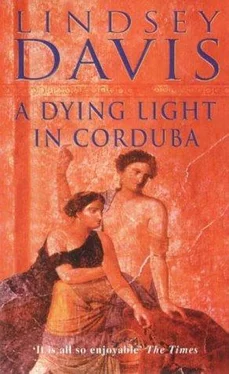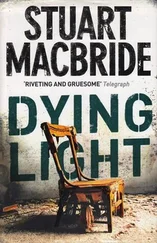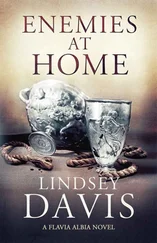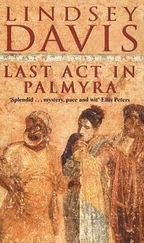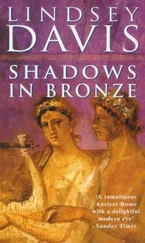Lindsey Davis - A dying light in Corduba
Здесь есть возможность читать онлайн «Lindsey Davis - A dying light in Corduba» весь текст электронной книги совершенно бесплатно (целиком полную версию без сокращений). В некоторых случаях можно слушать аудио, скачать через торрент в формате fb2 и присутствует краткое содержание. Жанр: Исторический детектив, на английском языке. Описание произведения, (предисловие) а так же отзывы посетителей доступны на портале библиотеки ЛибКат.
- Название:A dying light in Corduba
- Автор:
- Жанр:
- Год:неизвестен
- ISBN:нет данных
- Рейтинг книги:3.5 / 5. Голосов: 2
-
Избранное:Добавить в избранное
- Отзывы:
-
Ваша оценка:
- 80
- 1
- 2
- 3
- 4
- 5
A dying light in Corduba: краткое содержание, описание и аннотация
Предлагаем к чтению аннотацию, описание, краткое содержание или предисловие (зависит от того, что написал сам автор книги «A dying light in Corduba»). Если вы не нашли необходимую информацию о книге — напишите в комментариях, мы постараемся отыскать её.
A dying light in Corduba — читать онлайн бесплатно полную книгу (весь текст) целиком
Ниже представлен текст книги, разбитый по страницам. Система сохранения места последней прочитанной страницы, позволяет с удобством читать онлайн бесплатно книгу «A dying light in Corduba», без необходимости каждый раз заново искать на чём Вы остановились. Поставьте закладку, и сможете в любой момент перейти на страницу, на которой закончили чтение.
Интервал:
Закладка:
Cyzacus and Gorax had almost certainly wanted to make me waste time for no good reason. If those two managed to put a government agent out of action for a fortnight by trapping him on a very slow barge miles away from anywhere, they would feel proud of themselves. They were protecting their father, not realising how urgently I wanted to trace the dancer and that if I did go to Hispalis she would be my main quarry. I felt sure their father must have reported full details of the dinner, though whether he had told them anything about the attacks afterwards would depend on how much he trusted them. Clearly the poet's time in Rome, while it failed to make him a famous man of letters, had taught him to be a thoroughgoing Celtiberian pain in the backside.
I had now interviewed two suspects, Annaeus Maximus and Licinius Rufius. There were two more in Hispalis, assuming I ever made it there. Yet another pair could well be implicated, even though they had ducked out of the dinner on the palatine: young Rufius Constans and the Quinctius son. They had both been in Rome at the right time. Optatus reckoned Quinctius Quadratus exerted a bad influence on Constans – though until I met Quadratus and judged him for myself I had to allow for some prejudice in his ex-tenant. Yet the wary Greek secretary at the house of Quinctius Attractus who first told me that the two young men had bunked off to the theatre had been very reluctant to give me details. Neither the youngsters themselves nor their whereabouts had seemed important to the enquiry then. Now I was not so sure.
This was one avenue I would be able to pursue immediately, for Optatus had established that the three Annaei were holding their party only a couple of evenings later. Through old channels of communication he had obtained a ready invitation for the pair of us. Young Rufius was trying not to offend his grandfather by openly fraternising with rivals, so he was pretending to visit us that evening and we were taking him. Marmarides would drive us, and later bring home any who had managed to remain sober. Helena seemed to be remembering the last time I went off without her, when I could not even find the right way home afterwards. She saw us off with an intense sniff of disapproval. Apparently Claudia Rufina was taking the same attitude; she stayed at home with their grandparents, though she seemed very fond of her brother and had sportingly agreed not to give him away.
I myself took a conscious decision that evening not to wear anything that might show stains. Optatus had dressed up; he was in a suavely styled outfit that made excellent use of the famous Baetican cinnabar dye, a rich vermilion pigment, complemented by heavily formal black braid on the neck and shoulder seams. With this came an incongruous set of antique finger-rings and a faint waft of balsam around his carefully shaved jowls. It all gave him an air of being up to no good. Even so, he was outshone by the youth.
This was my first real encounter with Rufius Constans. We were all just in tunics – no ceremony in the provinces – and his was the finest quality. I was barely neat; Optatus had on his best. Rufius Constans could well look down on both of us. In his casually worn white linen, his gleaming niello belt, his shaped calfskin boots and even a torque (Jove!), he was far more comfortable in his clothes; he had coffers full at home. So here was a rich lad with high aspirations, setting off for a night among friends, beautifully turned out – yet he was jumpy as a flea.
Constans was pleasant-looking, nothing more. His nose, set in a young, unformed face, was a weak shadow of his sister's but there was something of her in the way he peered shyly at the world. At twenty or so, I felt he had not yet decided his ethical position. He seemed unfinished, and lacking the weight he would need for the elite public career his proud grandfather had charted for him. Maybe I was feeling old.
'I've been meaning to ask you,' I tackled the young man casually, 'how did you enjoy the theatre?'
'What?' He had a light voice and restless eyes. It may be that any lad of twenty who finds himself knee to knee in a jolting carriage with an older man who has a lively reputation may automatically look shifty. Or perhaps he had something to hide.
'I nearly met you during your trip to Rome with your grandfather. But you and Quinctius Quadratus decided to go to tne theatre instead.' Was it my imagination or did the playgoer look hunted? 'See anything good?'
'Can't remember. A mime, I think. Tiberius took me drinking afterwards; it's all a blur.'
It was too early in the night to turn nasty on him. I smiled and let the lie go past. I felt convinced it was a lie. 'You want to be careful if you go out on the town in Rome. You could get mugged. People are getting beaten up on the streets all the time. You didn't see any of that, I suppose?'
'Oh no.'
'That's good.'
'I'm sorry I missed the chance of meeting you,' Rufius added. He had been brought up to be polite.
'You missed some excitement too,' I said.
I did not say what, and he displayed no curiosity. An exceptional young fellow, apparently.
I felt sour. I was still thinking about the dead Valentinus, and even about Anacrites, when the carriage pulled up at the smatt out-of-town Annaeus residence.
Lucius Annaeus Maximus Primus, Lucius Annaeus Aelius Maximus, and Lucius Annaeus Maximus Novatus (to honour Spunky, Dotty and Ferret officially) knew how to throw a bash. Money was no object, and neither was taste. They had the household slaves scampering about with great vigour. It was all much more exciting than the stultified jollifications I had seen here at the Parilia festival. Released from parental authority, our hosts were being themselves, and a hilarious trio they were. I was glad they weren't my boys.
They had bought up every garland of flowers in Corduba. Their father's frescoed house smelt like all the gardens of ancient Tartessos, its air thick with pollen, a nightmare for sensitive noses. To add to the lamp smoke, the floral scents and the all-pervading aromatic odours of young bodies given unaccustomed hours of grooming, the lads had devised an Egyptian theme for the evening. It involved a few home-made dog-headed gods, some wicker snakes, two ostrich-feather fans, and cones of scented wax which new arrivals were instructed to wear on their heads: as the heat of the party rose so the cones would melt, giving everyone a bitter aura of Pharaonic myrrh and impossibly matted hair. I made sure I lost mine.
Word had gone around all the baths and gymnasiums in town that the three great lads were holding a party. The news had spread like foot-fungus. The seediest youths of the city had suddenly muttered to their parents that they were going over to a friend's house, being careful not to specify which friend. All over Corduba parents were now vaguely wondering where their pallid offspring had scuffled off to, and why there was such a reek of breath-freshening pastilles. Inadequate teenage owners of large personal allowances, mostly with skinny shoulders and pustular skin, had been waiting weeks for this night. They were hoping it would make men of them; the only certainty was that it would make them bilious.
Girls had come too. Some were nice, though their reputations might not last the evening. Some were slightly soiled to begin with and would be horrendous by the time they had swallowed several jugs of unwatered wine and had their frocks pulled off behind laurel bushes. Some were clearly professionals.
'It's worse than I expected, Falco,' Optatus confessed. 'You're getting too old to take it?'
'I feel like a bad-tempered grandfather.'
'You're not entering into the spirit.'
'Are you?' he huffed defiantly.
'I'm here to work.' That made me wonder: what was Marius Optatus here for? He had some ulterior motive, I was sure of it.
Читать дальшеИнтервал:
Закладка:
Похожие книги на «A dying light in Corduba»
Представляем Вашему вниманию похожие книги на «A dying light in Corduba» списком для выбора. Мы отобрали схожую по названию и смыслу литературу в надежде предоставить читателям больше вариантов отыскать новые, интересные, ещё непрочитанные произведения.
Обсуждение, отзывы о книге «A dying light in Corduba» и просто собственные мнения читателей. Оставьте ваши комментарии, напишите, что Вы думаете о произведении, его смысле или главных героях. Укажите что конкретно понравилось, а что нет, и почему Вы так считаете.
